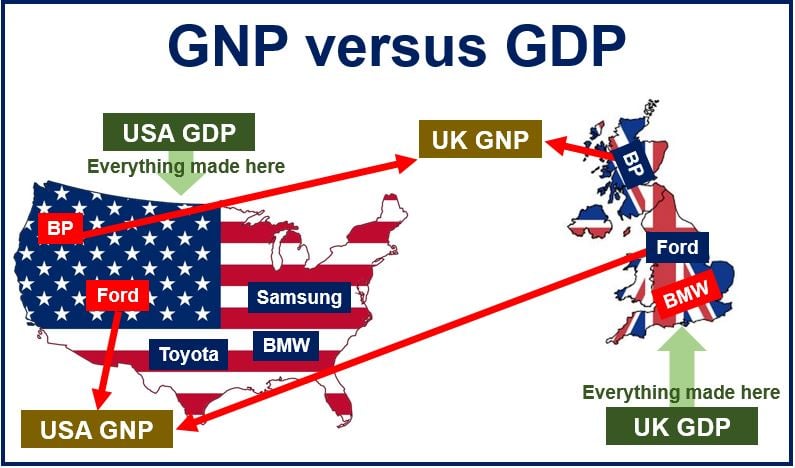Gross National Product (GNP) is an economic measurement of the total value of all final goods and services that a nation produces in a year and the income earned by its citizens (excluding income generated be foreigners in the nation’s economy).
It is a key economic measurement of the economic health of an economy. When GNP rises so does quality of living (assuming all other things stay the same).
Final goods and services refers to products sold to final consumers. In contrast to Gross Domestic Product (GDP), GNP allocates production based on ownership and not based on the location of production.
A simple way of viewing GNP is that it is equal to – GDP plus income earned by residents from overseas investments) minus (income generated by foreigners in the nation’s economy.
For example, in a scenario where American citizens generate more income from investments made overseas compared to foreigners generating income from producing in the US, the nation’s GNP would be higher than GDP. If, on the other hand, American income from overseas investments is lower than foreign production in the US, then GDP would be higher than GNP.
 GNP is everything made by the nationals of one country, including nationals living abroad, plus that country’s operations (companies) at home and abroad. GDP is everything produced within a country, regardless of nationality.
GNP is everything made by the nationals of one country, including nationals living abroad, plus that country’s operations (companies) at home and abroad. GDP is everything produced within a country, regardless of nationality.
According to nasdaq.com, Gross National Product (GNP):
“Measures an economy’s total income. It is equal to G.D.P. plus the income abroad accruing to domestic residents minus income generated in domestic market accruing to non-residents.”
Calculating GNP can be done via the income approach, which is achieved by summing up estimates of the various forms of income people receive from producing final goods and services, such as:
- Total wages and salaries
- Business profits
- Income from rent
- Income from interests
Before the 1990’s, it was more common for the The United States to use GNP as its primary measure of total economic activity compared to GDP. However, this changed when the Bureau of Economic Analysis (BEA) stated that GDP provided a better measure of economic activity and “virtually all other countries have already adopted GDP as their primary measure of production.”
